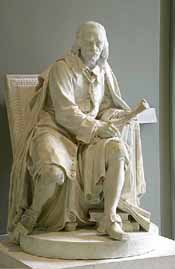
21 May 2006
DONIZETTI: Poliuto
Poliuto, Tragedia lirica in three acts.
Music composed by Gaetano Donizetti (1797-1848). Libretto by Salvatore Cammarano, after the tragedy Polyeucte (1640) by Pierre Corneille.
Mozart and Salieri, an opera in one act consisting of two scenes.
Nicolai Rimsky-Korsakov (1844-1908), composer. Libretto derived from Alexander Puskhin's play of the same name.
First performance: 7 December 1898 in Moscow.
Ariadne auf Naxos, Oper with a prologue and one act. Music composed by Richard Strauss. Libretto by Hugo von Hofmannsthal.
La Vestale, a tragédie lyrique in three acts.
Boris Godunov, an opera in four acts with prologue
Modest Mussorgsky, composer. Libretto by the composer, based on Alexander Pushkin's drama Boris Godunov and Nikolai Karamazin's History of the Russian Empire
First performance: 8 February 1874 at the Mariinsky Theatre, St. Petersburg
Il Trovatore, dramma in four parts.
Only a few months following the premiere of Der Rosenkavalier, Hugo von Hofmannsthal proposed a new opera to Richard Strauss based on Molière’s comedy-ballet, Le Bourgeois gentilhomme (in German, Der Bürger als Edelmann).
Die Entführung aus dem Serail, Singspiel in 3 Acts.
Music composed by Wolfgang Amadeus Mozart (1756–1791). Libretto by Johann Gottlieb Stephanie the Younger, based on an earlier libretto by
Christoph Friedrich Bretzner.
Die Entführung aus dem Serail, Singspiel in 3 Acts.
Music composed by Wolfgang Amadeus Mozart (1756–1791). Libretto by Johann Gottlieb Stephanie the Younger, based on an earlier libretto by
Christoph Friedrich Bretzner.
Arabella: Lyrische Komödie in three acts
Die Entführung aus dem Serail, Singspiel in 3 Acts.
Music composed by Wolfgang Amadeus Mozart (1756–1791). Libretto by Johann Gottlieb Stephanie the Younger, based on an earlier libretto by
Christoph Friedrich Bretzner.
La Gioconda, dramma lirico in four acts.
Music composed by Amilcare Ponchielli (1834–1886). Libretto by Arrigo Boito (under the pseudonym Tobia Gorrio), based upon Victor Hugo's Angelo, Tyrant of Padua (1835).
Don Carlo, an opera in four acts. Music composed by Giuseppe Verdi (1813–1901). Libretto by Joseph Méry and Camille Du Locle after Friedrich von Schiller’s dramatic poem Don Carlos, Infant von Spanien. Revised version in four acts (French text revised by Du Locle, Italian translation by Achille de Lauzières and Angelo Zanardini).
Un ballo in maschera, a melodramma in three acts.
Music composed by Giuseppe Verdi. Libretto by Antonio Somma, based upon the work of Eugène Scribe Gustave III ou Le bal masqué (1833)
Medea: Melodramma tragico in three acts.
Die Tote Stadt, an opera in three acts.
Music composed by Erich Wolfgang Korngold (1897-1957). Libretto by Paul Schott (Julius and E. W. Korngold) after the novel Bruges la morte by Georges Rodenbach.
Some Details concerning the Revolution inaugurated by Rossini
Manon Lescaut, dramma lirico in quattro atti
Elektra: Tragedy in one act.
Lyric Opera of Chicago has announced both schedules and cast-lists for is Spring 2020 performances of Richard Wagner’s Ring Cycle. Given the series of individual productions already staged by the company since Fall 2016, that pave the way for the complete cycle, Lyric Opera of Chicago’s complete production should affirm the artistic might of the great composer.
“Diacono himself does not know what musical talent he possesses” – Mascagni

Poliuto, Tragedia lirica in three acts.
Music composed by Gaetano Donizetti (1797-1848). Libretto by Salvatore Cammarano, after the tragedy Polyeucte (1640) by Pierre Corneille.
Streaming Audio
First Performance: 30 November 1848, Teatro San Carlo, Naples.
Principal Characters:
| Poliuto | Tenor |
| Paolina, his wife and daughter of Felice | Soprano |
| Severo, proconsul | Baritone |
| Callistene, high priest of Jove | Bass |
| Nearco, head of the Armenian Christians | Tenor |
| Felice, governor of Mitilene | Tenor |
Time and Place: Mitilene, capital of Armenia, circa 257.
Synopsis:
Act I
Poliuto has converted to the Christian faith, which is a forbidden cult. During the night, Poliuto goes to join his brothers in faith at a secret cavern. He is met by Nearco, to whom he alludes to his jealousy toward Paolina. Poliuto enters the cavern where he receives the sacrament of baptism. Unbeknownst to Poliuto, Paolina has followed him to the cavern. Nearco confirms her fears that Poliuto has converted. He exhorts Paolina not to disclose his secret. Felice, the governor and father of Paolina, has decreed that those who embrace the Christian religion shall suffer death. But, Paolina is also anxious because her former lover, Severo, is arriving as the Roman proconsul. She had believed Severo had died in battle and thus married Poliuto. The act concludes with Severo's entrance and his learning of Paolina's marriage.
Act II
At the home of Felice, Callistene, the high priest of Jove and rejected lover of Paolina, has arranged a meeting between Paolina and Severo. He has also arranged to bring Poliuto who sees them together just as Severo declares his love for Paolina. His honor stained, Poliuto vows revenge but then learns that Nearco has been arrested. He immediately go to the temple where Nearco is questioned by Callistene and Severo. He is asked to identify the person baptized the night before. Nearco refuses to answer. Poliuto, however, comes forward to confess. Paolina intervenes, begging Felice, Callistene and Severo to save her husband. In a fit of pride, Poliuto curses Jove as a false god and rejects his wife. Poliuto and Nearco are dragged away.
Act III
In the sacred wood near the temple of Jove, Callistene is irate. He announces to the other priests that the Christians have decided to follow Poliuto's example and to seek martyrdom. Confined in a cell, Poliuto dreams of Paolina transfigured by a strange light. He awakes and finds his wife before him. She implores him to save himself and to reject the Christian faith. He refuses. Suspecting Callistene's treachery, he tells Paolina of Callistene's behavior. Paolina clarifies the situation. Poliuto explains that his first obligation is to save his soul. Paolina decides to embrace Christianity and asks to die with her husband. Poliuto and Paolina are then sent to their execution.